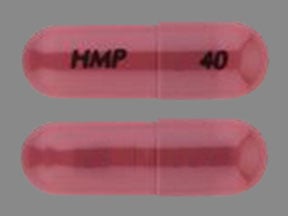
Esomeprazole Strontium Coupons & Savings Card – Discount Prices from $1231.08
Esomeprazole, also known as Nexium, is a medication designed to address various stomach and esophagus conditions, primarily caused by excessive stomach acid. These conditions include heartburn, acid reflux, gastroesophageal reflux disease (GERD), and inflammation of the esophagus due to GERD. It is effective in healing acid damage to the stomach and esophagus, reducing the risk of ulcers, and potentially preventing esophageal cancer. Esomeprazole is available both by prescription and over the counter.
As a proton pump inhibitor (PPI), esomeprazole works by reducing stomach acid production, which helps alleviate symptoms like heartburn, difficulty swallowing, and cough. While it effectively manages stomach acid-related conditions, it may take 1 to 4 days to experience full relief. Therefore, in the interim, other fast-acting antacids can be used for immediate symptom relief.
When using over-the-counter esomeprazole, such as for treating frequent heartburn occurring two or more days a week, it is crucial to read the product instructions and ingredient list carefully, as formulations can change. This ensures you are using the correct product safely. Always consult with a healthcare professional, like a doctor, nurse, or pharmacist, before starting any new medication to ensure it is appropriate and safe for you.
Our coupons are free to use. Before paying, show the pharmacist your Esomeprazole Strontium savings card to get your free discount. Use our filters below to edit the prescription box to match your needs. The Esomeprazole Strontium prices will update based on your prescription needs. Above our Esomeprazole Strontium coupons, you can change your location to see pharmacy prices and costs in other areas. We're here to help you buy Esomeprazole Strontium at the lowest price with our prescription discount card.
My prescription
Edit
49.3MG, Esomeprazole Strontium (30 Capsule Delayed Releases)
Select pharmacy

CVS
$1231.08
COUPON PRICE
Walmart
$1260.35
COUPON PRICE
Walgreens
$1271.34
COUPON PRICE
Albertsons
$1279.44
COUPON PRICEEsomeprazole Strontium savings card
Show this card to your pharmacist
CVS
$1231.08
BIN
ID
PCN
GRP
019876
LH834078DA
CHIPPO
LHX
Powered by
Esomeprazole, also known as Nexium, is a medication designed to address various stomach and esophagus conditions, primarily caused by excessive stomach acid. These conditions include heartburn, acid reflux, gastroesophageal reflux disease (GERD), and inflammation of the esophagus due to GERD. It is effective in healing acid damage to the stomach and esophagus, reducing the risk of ulcers, and potentially preventing esophageal cancer. Esomeprazole is available both by prescription and over the counter.
As a proton pump inhibitor (PPI), esomeprazole works by reducing stomach acid production, which helps alleviate symptoms like heartburn, difficulty swallowing, and cough. While it effectively manages stomach acid-related conditions, it may take 1 to 4 days to experience full relief. Therefore, in the interim, other fast-acting antacids can be used for immediate symptom relief.
When using over-the-counter esomeprazole, such as for treating frequent heartburn occurring two or more days a week, it is crucial to read the product instructions and ingredient list carefully, as formulations can change. This ensures you are using the correct product safely. Always consult with a healthcare professional, like a doctor, nurse, or pharmacist, before starting any new medication to ensure it is appropriate and safe for you.
Our coupons are free to use. Before paying, show the pharmacist your Esomeprazole Strontium savings card to get your free discount. Use our filters below to edit the prescription box to match your needs. The Esomeprazole Strontium prices will update based on your prescription needs. Above our Esomeprazole Strontium coupons, you can change your location to see pharmacy prices and costs in other areas. We're here to help you buy Esomeprazole Strontium at the lowest price with our prescription discount card.
More prescriptions for heartburn
coupons from$9.97Save 45%
coupons from$4.48Save 88%
coupons from$26.97Save 93%
coupons from$20.77Save 73%
coupons from$18.89Save 19%
coupons from$17.79Save 31%
coupons from$221.64Save 93%
coupons from$17.79Save 31%
More prescriptions for heartburn
Omeprazole Magnesium Save 45%coupons from $9.97
Eq Famotidine Max St Save 88%coupons from $4.48
Zegerid Otc Save 93%coupons from $26.97
Tagamet Hb Save 73%coupons from $20.77
Reglan Save 19%coupons from $18.89
Eql Stomach Relief Save 31%coupons from $17.79
Omeprazole-sodium Bicarbonate Save 93%coupons from $221.64
Sm Stomach Relief Save 31%coupons from $17.79
Esomeprazole Strontium dosage forms
Use our Esomeprazole Strontium 49.3MG coupon with prices from $1231.08 for 30 Capsule Delayed Releases.
Dosage Quantity Price from Per unit 49.3MG 30 Capsule Delayed Releases $1231.08 $41.04
| Dosage | Quantity | Price from | Per unit |
|---|---|---|---|
| 49.3MG | 30 Capsule Delayed Releases | $1231.08 | $41.04 |
